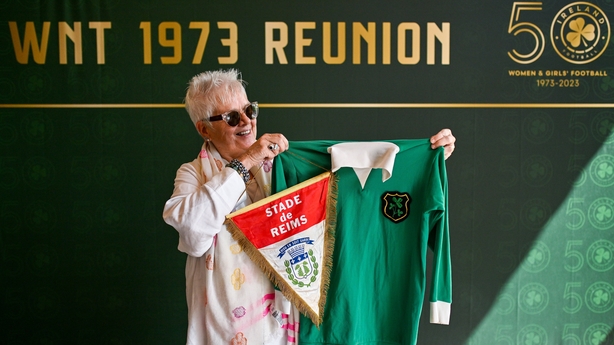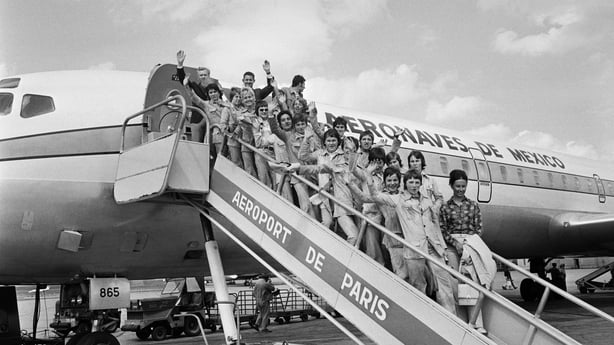Analysis: Irish women's football in the 1970s enjoyed a friendship and rivalry with one of France's leading teams Stade de Reims
By Helena Byrne, British Library
To mark International Women's Day 2024, the documentary film Copa 71 will be released nationwide across Ireland and Britain. You might not have heard of Copa 71 before, but it was the largest unofficial tournament for women’s soccer. These tournaments were funded by corporate supporters and Copa 71 was held in Mexico City in August 1971, decades before we had the official Women's World Cup.
Teams from Mexico, Argentina, England, Denmark, France and Italy played in sold out stadiums that hosted the men’s FIFA World Cup the year before. This was the third unofficial international competition organised by Fédération Internationale Européenne de Football Féminine (FIEFF).
Trailer for Copa 71, the extraordinary story of the 1971 Women's Football World Cup told by the pioneering women who participated in it and built from archive unseen for fifty years
These tournaments, along with the global growth of women's football from the late 1960s, put huge pressure on FIFA and UEFA to start paying attention to the development of the sport. In June 1971, UEFA mandated its members to take control of women's football in their jurisdictions. This was an attempt to stifle corporate interests developing the sport outside of the UEFA structure.
Copa 71 received huge media coverage in Mexico and the players were treated like celebrities. However, England's team Chiltern Valley, who participated in the competition, received very little media coverage at home. They now feature in the documentary and tell an important piece of women's football history overlooked by many.
50 years on - pioneers for the women's game the Jeyes team, managed by Pat Noone on their 1972 tour to France, special guests tonight. #COYGIG pic.twitter.com/bEuzbLbsu5
— Jonathan Hill (@JonathanFAI) September 1, 2022
The club that represented France in this early international tournament was the celebrated Stade de Reims, affectionately referred to as 'Les Rémoises' (meaning from Reims). For a handful of years Ireland's women footballers enjoyed a close relationship and rivalry with the club. This was during the early, pioneering days of international women's football in Ireland, before the Women's FAI was even formed.
During a packed season in 1972, with matches in Indonesia, Spain and Germany, the globetrotting Les Rémoises met Irish team Jeyes, dubbed the 'Dublin' champions, in September. The Jeyes were on a four-match tour of France and the tournament was a landmark moment for women's football in Ireland. It's not clear how the relationship between Stade de Reims and Ireland started. Nevertheless, it was cemented by the tour to France of the Dublin-based team from Jeyes factory.

While in Paris, Jeyes manager Pat Noone, a leading figure in organising women's soccer in Ireland, attended a meeting with other team managers from various countries. It's probable that this meeting was organised by FIEFF, but as they failed to organise a tournament in 1972 the organisation then disbanded. Then in the summer of 1973, Stade de Reims returned the favour and visited Ireland for a tour that consisted of seven matches around the country, over a two week period:
1. Dublin Selection, Fortfield Road (St. Mary's R.F.C.), August 18.
Score: 1 - 3
2. Dundalk Selection, Oriel Park, August 20.
Score: 1 - 3
3. Limerick Selection, Markets Field, August 21.
Score: 1 - 3
4. Evergreen (Kilkenny), Tennypark, August 24.
Score: 0 - 3
5. Irish International XI, St. James's Park (greyhound track in Kilkenny), August 26.
Score: 2 - 1
6. Benfica (Waterford), Tycor Grounds, August 28.
Score: 0 - 2
7. Dublin Selection, Carlisle Grounds (Bray), August 30.
Score: 3 - 4 (match abandoned with only 4 minutes left)

Stade de Reims player Renée Delahaye recalled the Irish visit. "In 1973, I had just arrived at Stade de Reims. I was 15, this was my first trip and I didn't know anyone except Pierre Geoffroy, the coach who had recruited me, and Maryse Lesieur, player and manager. I have excellent memories of this beautiful trip to your magnificent country of Ireland".
It was during this tour of Ireland that Irish football legend Anne O'Brien first came to their attention. O'Brien played for Dublin club All Stars when she was selected to play for the various teams that faced Stade de Reims during their tour. Geoffrey was impressed with her style and offered her a contract to play football with his team. News of the transfer made international headlines. However, professional football in France was not permitted for women so Geoffrey arranged work for O’Brien and a number of other French players in a local factory. O’Brien then moved to France in January 1974 after she turned 18.
We need your consent to load this rte-player contentWe use rte-player to manage extra content that can set cookies on your device and collect data about your activity. Please review their details and accept them to load the content.Manage Preferences
From RTÉ Archives, in January 1974 French women's soccer club Stade de Reims signs 17-year-old Anne O’Brien from Inchicore in Dublin on a three year contract
In November 1975, a Dublin Castle selection, with guest players from other Civil Service League teams, travelled to France to play against Stade de Reims. The match was played on November 29th and the score finished 4-1 to the French side. The Dublin Castle goal was scored by Jane Cowhey.
Margaret Tracey remembered that "after the match Anne O’Brien [now playing for Reims] told me that we were the only team to score against them that season and that the Reims players and coaches were not happy". The relationship between Stade de Reims and Ireland ended in early 1976 when O’Brien left France and joined the Rome-based club, Lazio.
Helena Byrne is a librarian that specialises in web archiving and an independent researcher focusing on the history of women’s football in Ireland. She regularly contributes history segments to FAI Women's National Team match programmes. Recently, she contributed to projects that celebrated the fiftieth anniversary of the formation of the Republic of Ireland's Women's National team in 1973.
Follow the RTÉ Brainstorm WhatsApp channel for more stories and updates
The views expressed here are those of the author and do not represent or reflect the views of RTÉ

